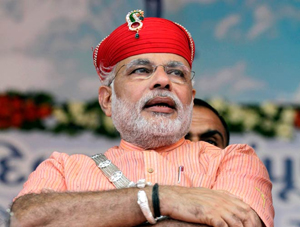 New York, Oct 27: Narendra Modi, BJP's prime ministerial candidate, cannot hope to lead India effectively if he inspires "fear" and "antipathy" among many of its people, the New York Times has commented in an unusual move.
New York, Oct 27: Narendra Modi, BJP's prime ministerial candidate, cannot hope to lead India effectively if he inspires "fear" and "antipathy" among many of its people, the New York Times has commented in an unusual move.
"Mr Modi has shown no ability to work with opposition parties or tolerate dissent," the Editorial Board of the New York Times said in a stinging editorial on the 63-year-old BJP leader.
The editorial said that Modi has already "alienated" BJP's political partners when Janata Dal (United), an important regional party broke off its 17-year alliance with the "party because it found Mr Modi unacceptable."
India was a country with multiple religions and "Mr Modi cannot hope to lead it effectively if he inspires fear and antipathy among many of its people," it said while recalling that nearly 1,000 people died in the 2002 riots in Gujarat.
The editorial, published yesterday, also questioned Modi's economic track record in Gujarat.
The "economic record in Gujarat is not entirely admirable, either," it said.
"Muslims in Gujarat, for instance, are much more likely to be poor than Muslims in India as a whole, even though the state has a lower poverty rate than the country," the editorial said.
"His rise to power is deeply troubling to many Indians, especially the country's 138 million Muslims and its many other minorities," said the 19-member Editorial Board, headed by India-born Andrew Rosenthal, the editorial page editor of The New York Times.





Comments
Add new comment